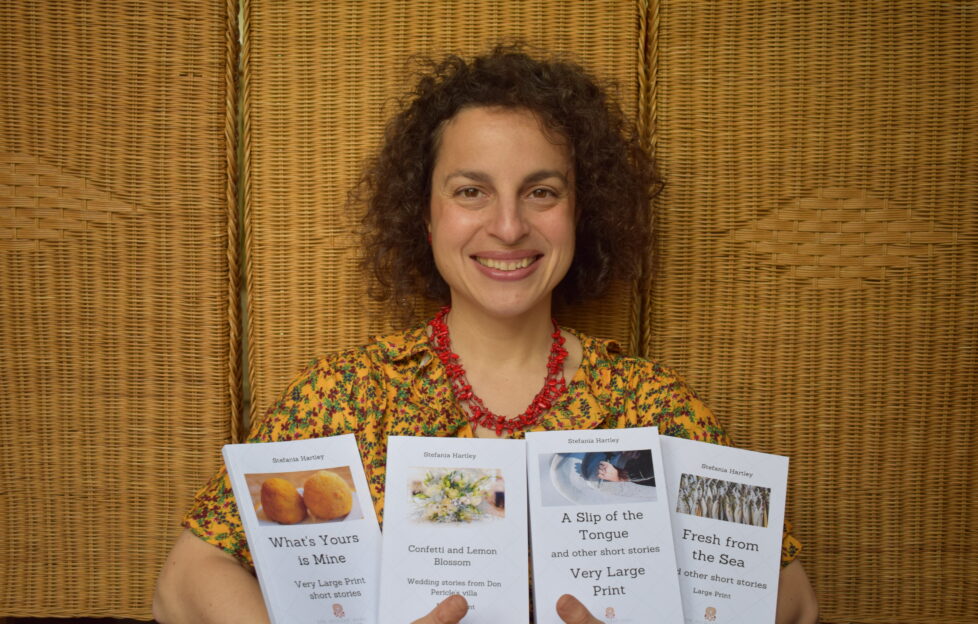Alan Chats To Writer Stefania Hartley

Stefania Hartley has been delighting “Friend” readers with an array of stories since 2016. Here I ask Stefania about her writing journey.
How does it feel to be an established “Friend” writer, and does that now come with any pressure?
It’s a lovely feeling. The “Friend” is like a family and it’s really nice to feel part of it. I often think back to when I sold my first story to the magazine. I had no idea what a big part of my life the “Friend” would become and how much pleasure I would get from writing for the magazine over the subsequent years.
However, with expectations comes pressure, and I feel it especially with the Tanino and Melina stories. But I know that I can trust my editor to tell me when one of my stories isn’t up to the mark. This way, I can rest assured that readers won’t be disappointed after reading one of my stories.
Recently, I was writing a story about a fisherman and I thought it would be nice to write a paragraph from the point of view of the octopus. I wasn’t at all sure about it, but I thought I should give it a go. So, when my editor said that he wasn’t sure about it, either (he’s way too nice to say, “That’s a rubbish idea!”), I cut it out of the story without regrets.
Knowing that each story will be read by my editor first, then the Fiction Editor and then Editor Angela before being approved, gives me the confidence to try new things in my writing.
So yes, I do feel the pressure to give readers a better story than the last one, but I also know that if I overshoot there’s a safety net to catch me!
Your stories are often sprinkled with humour. How vital is for you to make the reader smile?
I always try to write a story that I would enjoy reading, and my favourite stories to read are the ones that make me smile, chuckle or even laugh. If a story can make me smile, can teach me something new, can show me things from a different perspective and can inspire me, then it has ticked all the boxes for me.
I love humour in stories, just like in life. After reading something that has made me smile, I’m always in a better mood and a much nicer person to be around – my family will tell you! So, bring on the humour.
Where did the idea come from for Palermo’s favourite couple, Tanino and Melina? Can you believe you are still writing them to this day?
No, I can’t believe it. The idea of Tanino and Melina came to me one day out of the blue and I immediately knew that I had to write their stories and that it would be a lot of fun. When something like that happens, it’s exhilarating for a writer. It’s very special and rare.
The inspiration behind them are my parents, my grandparents, family and friends – all the couples I have observed throughout my childhood in Sicily. But now that I’ve written more than thirty Tanino and Melina stories, the two characters have taken a life of their own.
This is a very good thing, especially because last February my dad passed away and I thought I would never write a Tanino and Melina story again. But in the last month, Tanino and Melina have come back to me and I’ve started writing the stories again.
My dad had been fond of their stories (I would translate them into Italian for him and Mum) and I know that he would be happy to know that I’m continuing writing them.
Apart from short stories, you have written a series for the magazine. Did you enjoy the change in direction?
I did! It was a steep learning curve, but also great fun to come up with new ideas for each episode. Striking the right balance for each episode between independence and connectedness was a challenge, but great practice. Fitting a full story into the short word count was harder than I had imagined, but also very rewarding.
Now, I have collected the thirty published stories, plus a new one never published before, into a book, “Tales From The Parish”.
The extra story came about because of the cover illustrator. I gave him total freedom and he sent me a beautiful sketch with a hot air balloon right in the middle of the cover. I loved it, but I didn’t have a hot air balloon story in the book. Instead of asking him to remove the balloon, I decided to write the story.
I believe you are now writing a novel, too. Can you say a little about that project?
It’s interesting that you ask, because the idea for that project came from my Tanino and Melina stories. And it didn’t come from me.
I had been trying to write a novel in a style that I thought readers wanted. I found it really hard; my heart wasn’t in it and, of course, it showed. I was moaning to a writing friend about it when, instead of offering compassion or answers, she asked me some simple questions, starting with, “What do you enjoy writing?”
“My short stories for ‘The People’s Friend’,” I said.
“Then why don’t you write in the same style as your Tanino and Melina stories?” she replied.
I thought I should try. So I started writing a novel about fifty-year-old Crocetta Colonna, who is convinced that she will finally meet “The One” at her friend’s wedding but, instead, falls in love with the grumpy widower tailor she’s hired to enlarge her dress for the occasion.
There’s lots of humour in it and I’m loving writing it.
Do you think it’s a natural progression for writers to go from the likes of short stories to novels?
I don’t think that’s necessarily true. A lot of other writers tell me, “How do you fit an entire story in two thousand words? I could never do it.” And I tell them, “How do you keep a story going for seventy thousand words without getting tired half-way through?”
I believe that some writers have a gift for short stories, others have a gift for novels, and some are able to write both but might find one easier than the other.
Now I’m trying to find out which kind I am!
Did you always want to be a writer?
No. When I was growing up, back in Italy, I got great marks for my school essays and I loved reading. But when my teachers suggested I should study Italian literature at university and maybe even become a writer, I imagined Jessica Fletcher in the TV series “Murder She Wrote” (which I watched on TV), and I always said “no.”
I was way too young to live in a small town, wear pearls and sit behind a typewriter! There was a whole world out there to be explored. So, I explored the world, fell in love with an Englishman and moved to the UK.
For many years I was stuck in between two languages, English and Italian. One I hadn’t yet mastered, while the other was getting rusty. Years went by and, one day, I submitted an article to the science magazine my teenage students (I was previously a science teacher) were reading.
To my amazement, my article about the extraction of salt from the sea in Sicily was published. If my English was now good enough for publication, what else could I write? That’s how it all started.
Sicily is the setting in many of your stories. As a writer, is this important to you?
Sicily is very dear to me because it’s the place of my childhood memories. Many of my stories set in Sicily have that surreal, dreamy quality of memories, which I don’t get when I set my stories somewhere else. The Sicily you find in my stories has all the beauty left in but all the ugly bits taken out and forgotten, like it happens in happy memories.
What’s your favourite thing about reading and writing fiction?
For me, reading is like stepping on to an aeroplane and flying to other countries. It’s like entering a time-machine and travelling to other ages; climbing into other people’s clothes and living their lives. It’s amazing that anyone can do that just with words.
Writing is just as amazing: you create the places, the times, the characters your readers are going to experience. I’ve done many jobs and I’ve always got bored of them quite quickly. Writing is the only job that, after ten years, still hasn’t bored me.
The people who have inspired stories and the writers who have written them will pass on, but so long as there are readers, their stories live on for ever.
That’s, perhaps, my favourite thing.





